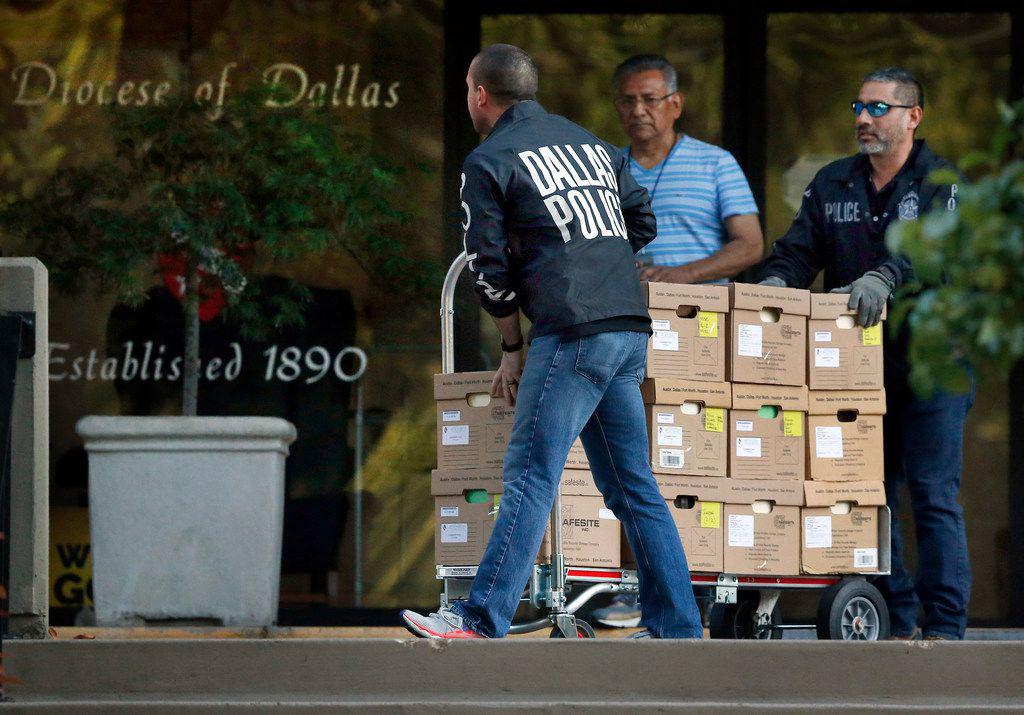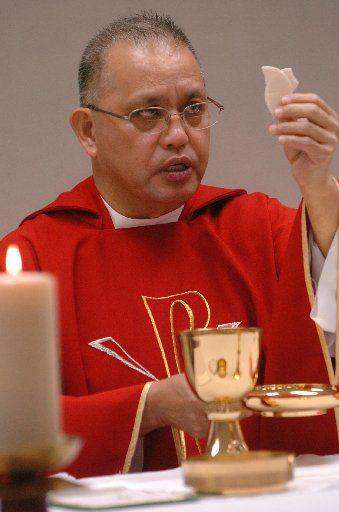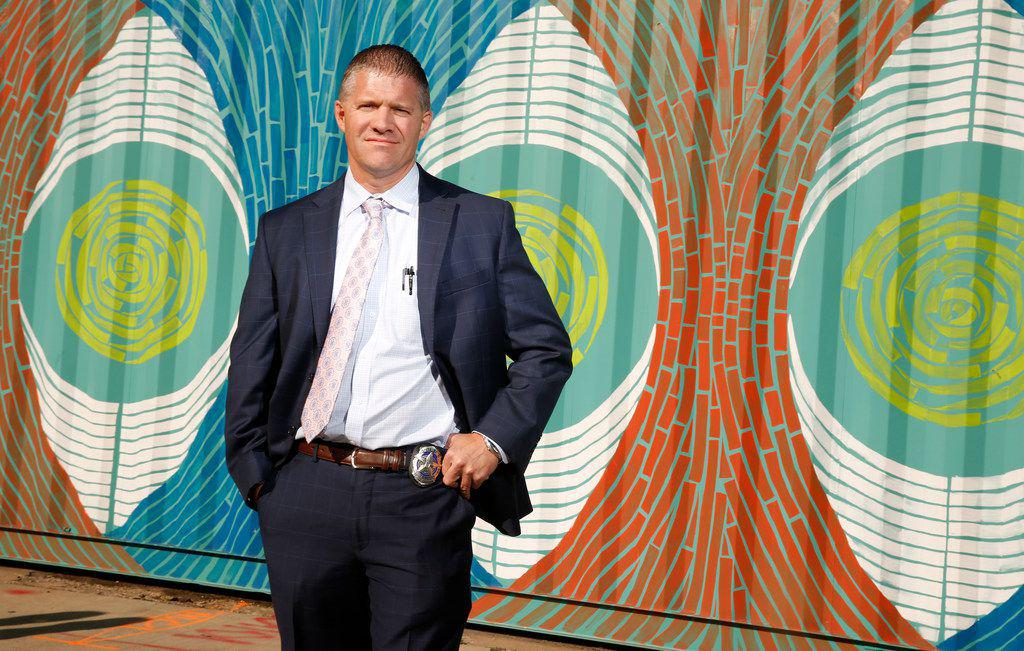|
Dallas police investigation into sex abuse claims by priests stalled while attorneys sort through records
By Jennifer Emily And David Tarrant
Six months after Dallas police raided Dallas Catholic Diocese offices for records related to allegations of sexual abuse by priests, the investigation appears stalled. Attorneys for the diocese and the city of Dallas are sorting through the records seized in the May 15 raid on diocesan property to determine which ones involve the five priests named in the search warrant, according to documents obtained by The Dallas Morning News. State District Judge Brandon Birmingham, who signed the search warrant for the records, ordered that Dallas police must return all records that are not related to the investigation or any record that “exceeds the scope of the search warrant as written,” court records show. Some records are exempt from disclosure because they are protected by attorney-client privilege. The court said the diocese and the police have until Dec. 6 to complete their review of the seized documents. Annette Taylor, spokeswoman for the Dallas diocese, said some records have already been returned. “The concern is that documents were indiscriminately seized," Taylor said. "The boxes that were taken included operational documents, business matters, and cemetery records, etc. The judge has determined that documents beyond the scope of the warrant were improperly taken and has ordered their return. These documents are important to the operational and day-to-day affairs of the diocese.” The Dallas Police Department said in an email that the department is not yet reviewing the records, but attorneys for the city and the diocese are reviewing the records at the department’s headquarters to determine what should be excluded. “These investigations are complex processes and the Dallas Police Department continues to investigate all accusations of abuse,” the department said in the email. The diocese also wanted Dallas police to return records involving the priests named in the affidavit that aren’t related to abuse allegations. But the judge said the police can have access to all records involving those priests. According to a search warrant affidavit, the investigation is focused on five priests: Richard Thomas Brown, Alejandro Buitrago, William Joseph Hughes Jr., Jeremy Myers and Edmundo Paredes. They’re all on a list of 31 priests “credibly accused” of sexual abuse of minors since 1950 that the Dallas diocese published on its website in January. The five priests were living at the time of the raid. But they were retired, on leave or being laicized — removed from the clergy. The diocese added another name to the credibly accused list in July, bringing the total to 32. Many of the others on the list have died. Dallas police Detective David Clark wrote in the May search warrant affidavit that police had uncovered new allegations against the five priests, including Paredes. But the diocese was making it nearly impossible for police to determine whether the accusers’ claims had been fully examined by the church, Clark said. At the time, the detective criticized the diocese’s efforts at transparency, characterizing them primarily as public relations. Clark did not immediately return a request for comment Monday. At a news conference immediately after the raid, Dallas Bishop Edward Burns denied the diocese has “hidden or concealed” information about clergy sexual abuse, including the names of priests or other clergy accused of such crimes. Paredes fled Dallas almost two years ago and is believed to be living in his native Philippines, according to diocesan officials. He is accused of molesting four minors. A warrant was issued for his arrest in January but the details of the allegations were not made public until the search warrant affidavit for the raid on the diocese was released. Brown, who was on leave when the list was released, was accused of molesting a minor in the 1980s. A woman wrote to the diocese saying Brown molested her niece, court records show. Clark found Brown in Pecos, N.M., where Brown identified victims not mentioned in his personnel file. Brown admitted he sexually abused as many as 50 children during his time at the diocese. Dallas police began investigating Buitrago after he was included in the credibly accused list. Then on Feb. 20, a woman told police that Buitrago molested her when she was 5 to 7 years old. Buitrago, who was removed from the priesthood in 2018, has disputed his inclusion on the credibly accused list. Hughes was accused in a 1994 civil lawsuit of having an ongoing sexual relationship with a minor. The lawsuit was settled in 1998 and Hughes admitted to the abuse, the search warrant affidavit says. The affidavit said the diocese once had letters written between the priest and the minor but they were destroyed, Myers is also accused of having of having repeated sexual contact with a minor, court records show. The abuse allegedly occurred in Arkansas at a school but Myers also visited the student in Dallas. Burns said that throughout the “collaboration with the police, there are some who are not satisfied and want to look for themselves.” “We know we have given them the files,” he said. “And so we say, ‘By all means, look.’” A year ago, Burns announced the diocese had hired former state and federal law enforcement investigators to comb through clergy members’ files as part of its effort to publish a list of priests who have been credibly accused of sexually abusing minors. Since the Dallas Diocese released the list, at least four men have come forward with accusations against priests and filed lawsuits. At least one of the priests was not on the credibly accused list. Burns — whose Dallas diocese comprises 1.3 million Catholics in nearly 75 parishes over a nine-county area — said the church wanted to “protect our children, create a safe environment, to promote healing for those who’ve been abused, and to demonstrate that we are focused on facing this issue.” But advocates for abuse survivors like Paul Petersen of Survivors Network of those Abused by Priests have questioned whether the lists were complete and credible and called for independent and trained law enforcement experts to review all files and allegations related to clergy sexual abuse. Petersen questioned whether the Diocese was being as open as it claims to be. He is the leader of the organization’s Dallas-Fort Worth chapter. “Any committed Catholic in Dallas should support survivors and victims by letting the police do their job. Burns’ own words stated that ‘no institution has done more;’" Petersen said. "These are hollow words he uses in press conferences. Really? These files represent real people, real kids, and likely real abuse. If it were anything else, how can this be seen as transparency? Why is Burns telling his lawyers to fight?”
|
.
Any original material on these pages is copyright © BishopAccountability.org 2004. Reproduce freely with attribution.


